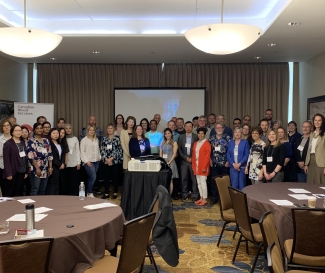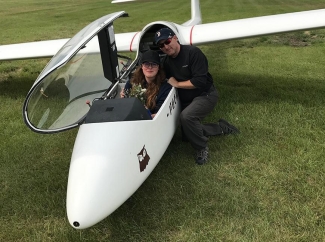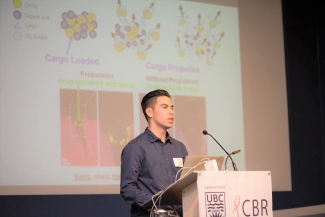Research trainees on why eligibility, donor care, and science blogging matter to them
Friday, September 06, 2019 Canadian Blood Services trainees
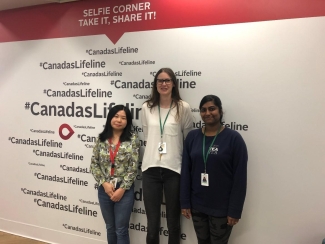
On the 30th of May 2019, an eager group of Canadian Blood Services trainees gathered In Calgary, Alta. for the Centre for Innovation’s Research Trainee Workshop. The day started with an in-depth look at donor eligibility, before moving on to a donor-focused tour of the clinic and concluding with a seminar on science blogging.
The experience prompted three attendees - Wenhui Li, Carly Olafson and Anusha Sajja - from the Acker Lab at Canadian Blood Services Edmonton to ask themselves the following:
What do the donation criteria mean to me, as a researcher?
As trainees conducting research at Canadian Blood Services, we have a strong understanding of how vital donation criteria are to the safety of our national blood supply. Donor and recipient safety are paramount, and the criteria provide a structure to ensure the health of all Canadians. Canada is a diverse country and each donor is different from the next; our donor selection criteria, while rigid in their application, are always adapting to best serve Canadians. We understand that as researchers, our work can play a role in positive change to these criteria.
The donation criteria exist as a hefty heap of paper in a carefully arranged binder. As we flipped through those pages it became clear the immense amount of research that had gone into creating such a thorough guide for donor eligibility. It is our goal to put that same amount of care and meticulous detail into the work that we do in our laboratory.
Safeguard. Engage. Improve. These three words express Canadian Blood Services’ commitment to Canadians to maintain and protect the blood system. We choose to emulate these same values as we work to optimize the collection, processing, and storage of blood products through our research.
Learn more about donor eligibility criteria here.
What does donor care mean to me, as a researcher?
After delving into donor selection criteria, we stretched our legs on a tour of the donor centre. We were lucky enough to follow a platelet donor through the centre as he checked in and prepared for his donation. A cheerful greeting as he walked through the door, a comfortable chair to sit in while he waited, carefully worded questions: all to ensure his donor experience was as pleasant as possible. Then we heard from the donor himself. He spoke about how he drove two hours to donate platelets after receiving a call that he was a match. The commitment and the sacrifice he made was astounding. We realized just how selfless these donors are and suddenly the intense care that goes into each donor experience made sense. They are giving part of themselves to save the life of a complete stranger; they deserve every ounce of comfort we can provide.
After the donor centre tour, Anusha Sajja recalled her time volunteering in a blood bank back in India where blood units for patients in need were often sought from relatives, as patients were unable to rely solely on the selfless donations of strangers. The country lacked an adequate supply of blood products to ensure the health of its citizens. The experience made it clear that our blood system is a unique and invaluable one, further emphasizing the need for outstanding donor care to ensure donors continue to contribute to the lifeline that is our blood system.
Learn more about Canadian Blood Services’ commitment to patient safety and to donors.
How can science blogging help us as researchers?
Writing as a researcher usually means reports, project proposals, theses, or grant applications. But what if we want more? What if we want to write about science not only for other scientists but also for the general population? That is where the art of blogging can provide the freedom to educate and inform, without the strict format that can come with other types of writing.
Centre for Innovation knowledge broker Geraldine Walsh encouraged us to share our research with a larger audience through blogging, with extra attention to using language that is not only informative but also accessible. After all, what good are any of our results if they aren’t shared with the world? Not everyone wants to trudge through journal articles, trying to decipher results, but most people have an innate curiosity that drives them to learn. That is where blogging fits into the world of scientific discovery; providing an avenue for all to learn about the research that we have put so much care into.
At the end of the day we all concluded that the Research Trainee Day was a huge success. We left feeling inspired; our minds were reinvigorated with the knowledge that what we do really does matter. The experience motivated us to delve into our research, knowing that we can contribute to positive change for donor selection and care. And lastly, we gained an appreciation for the art of blogging as a means to share our ideas and our discoveries with the world.
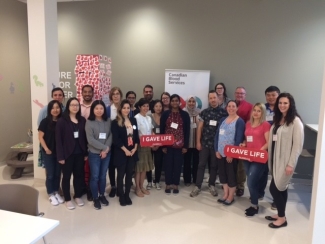
Canadian Blood Services – Driving world-class innovation
Through discovery, development and applied research, Canadian Blood Services drives world-class innovation in blood transfusion, cellular therapy and transplantation—bringing clarity and insight to an increasingly complex healthcare future. Our dedicated research team and extended network of partners engage in exploratory and applied research to create new knowledge, inform and enhance best practices, contribute to the development of new services and technologies, and build capacity through training and collaboration. Find out more about our research impact.
The opinions reflected in this post are those of the author and do not necessarily reflect the opinions of Canadian Blood Services nor do they reflect the views of Health Canada or any other funding agency.
Related blog posts
The Canadian Society for Transfusion Medicine’s annual conference took place in Calgary, Alberta in early June. The Centre for Innovation’s Geraldine Walsh was there and shares her highlights.
For this instalment of “Meet the researcher”, we met with Dr. Jason Acker, a senior research scientist at Canadian Blood Services who specializes in the manufacturing and storage of blood components. “What gets me up in the morning is the knowledge that through the work of my team and my...
The Centre for Blood Research’s symposium was held in Vancouver, British Columbia in April. Featuring talks from world-class researchers, trainees and patients, the Norman Bethune Symposium provided attendees with the perfect blend of information and inspiration.
